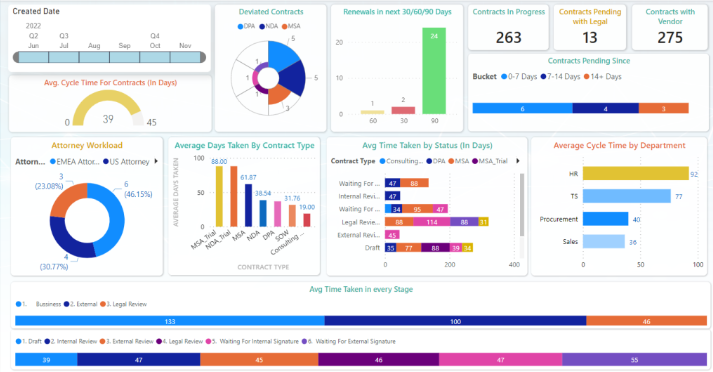Introduction
Are you tired of sifting through stacks of contracts, trying to pinpoint critical information quickly? Contract analytics might be the superhero your business needs! Imagine effortlessly extracting valuable insights from your contracts with just a few clicks. Intrigued? Let’s dive into the world of contract analytics and discover when it should be used to revolutionize your business processes.
Understanding the Importance of Contract Analytics in Businesses
In today’s fast-paced business world, understanding the importance is crucial for staying competitive. Contract analytics enable businesses to efficiently manage and analyze large volumes of contracts, extracting valuable insights that drive informed decision-making.
By leveraging contract analytics, organizations can better understand their contractual obligations, risks, and opportunities. This allows them to mitigate potential legal and financial risks while maximizing revenue streams through optimized contract management.
Moreover, contract analytics enhance operational efficiency by automating the review process and identifying key terms and clauses within contracts swiftly. This not only saves time but also reduces human errors that may lead to costly consequences down the line.
Embracing empowers businesses to streamline their contracting processes, improve compliance with regulations, and achieve better outcomes in an increasingly complex business landscape.
Benefits of Using Contract Analytics
Contract analytics offer many benefits to businesses looking to streamline their operations and mitigate risks. One major advantage is the ability to gain valuable insights from large volumes of contracts quickly and accurately. By harnessing the power of AI and machine learning, contract analytics can help organizations easily extract key data points, clauses, and obligations.
Another benefit is improved compliance management. Tools can flag potential non-compliance issues by identifying discrepancies between contractual terms and regulatory requirements. This proactive approach helps businesses stay on top of their legal obligations and avoid costly penalties.
Moreover, contract analytics enhance negotiation strategies by better understanding past agreements and market trends. Armed with this knowledge, companies can negotiate better terms, reduce bottlenecks in the contracting process, and ultimately improve profitability.
Furthermore, utilizing this strategy leads to enhanced risk management capabilities. By identifying high-risk clauses or vendors early on, organizations can take preemptive actions to mitigate potential threats before they escalate into larger problems.
Common Use Cases for Contract Analytics
When it comes to contract analytics, there are various common use cases that businesses can benefit from. One typical scenario is streamlining the review process of large volumes of contracts. This helps identify key terms and clauses efficiently.
Another common use case is leveraging contracts for risk management purposes. By analysing contracts comprehensively, organizations can proactively identify potential risks and mitigate them before they escalate.
Contract analytics also plays a vital role in ensuring compliance with regulatory requirements. By utilizing advanced technologies, businesses can automatically track and monitor adherence to specific regulations outlined in contracts.
Moreover, optimizing vendor relationships is another prevalent use case. By extracting insights from vendor contracts, companies can negotiate better terms and improve vendor performance.
Types of Technologies and Tools Used in Contract Analytics
When it comes to contract analytics, businesses rely on a variety of technologies and tools to streamline the process.
One common tool is Natural Language Processing (NLP), which helps extract key information from contracts by understanding the language used.
Machine learning algorithms are critical in analyzing vast amounts of data within contracts to identify trends, risks, and opportunities.
Blockchain technology ensures secure and transparent contract management by providing an immutable ledger for all contract-related transactions.
Artificial Intelligence (AI) platforms can automate tasks like contract creation, review, and monitoring, saving time and reducing errors.
Cloud-based solutions offer scalability and accessibility for teams working remotely or across different locations.
Leveraging these advanced technologies empowers businesses to enhance their contract management processes efficiently.
Challenges and Solutions for Implementing Contract Analytics
Implementing contract analytics in a business comes with its set of challenges. One common obstacle is the complexity of contracts, which may vary in language and format. This can make it difficult for traditional methods to efficiently extract and analyze data.
Another challenge is ensuring the accuracy of the analyzed data, as errors can lead to misleading insights and decisions. Additionally, managing large volumes of contracts manually can be time-consuming and prone to human error.
To overcome these challenges, businesses are turning to advanced technologies such as artificial intelligence and machine learning. These tools can automate contract review, flag key terms or risks, and extract valuable data for analysis.
Furthermore, it is crucial to implement proper training programs for employees on how to use tools effectively. This ensures that teams have the necessary skills to successfully leverage these technologies in their day-to-day operations.
Final Thoughts on When to Use Contract Analytics
In today’s fast-paced business environment, leveraging contract analytics can give organizations a competitive edge. By utilizing advanced technologies and tools, businesses can efficiently manage their contracts, mitigate risks, and optimize their decision-making processes. The benefits are undeniable, from reducing legal exposure to improving compliance and enhancing operational efficiency.
Whether you are a small startup or a large enterprise, incorporating it into your operations can streamline processes and drive better outcomes. By understanding the importance of and identifying common use cases in various industries, organizations can harness the power of data-driven insights to enhance their contractual relationships.
While implementing may initially pose some challenges, solutions are available to overcome them. Businesses can maximize the value derived from initiatives by investing in the right technology platforms and ensuring proper staff training.
Knowing when to use contract analytics is crucial for maximizing its potential impact on your business. By embracing this powerful tool at the right time, organizations can unlock new opportunities for growth and success in an increasingly complex business landscape.




















